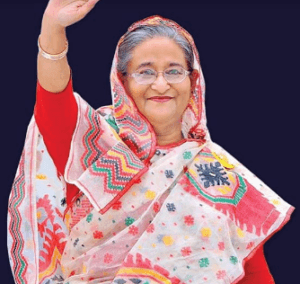Contents
Sheikh Hasina Wazed (in Bengali : শেখ হাসিনা ওয়াজেদ) is a Bangladeshi politician and current Prime Minister of the country. Since 1981, she has been president of the important political party Awami League of Bangladesh. She is the eldest of the five children of Sheikh Mujibur Rahman, the first president and founding father of Bangladesh. Sheikh Hasina’s party defeated the four-party alliance headed by the BNP in the 2008 parliamentary elections, thereby securing her position as prime minister. Previously between 1996 and 2001, Sheikh Hasina had already been Prime Minister of Bangladesh.
|
Quick Facts
|
|
|---|---|
 |
|
| Born |
September 28, 1947
|
| Age | 78 years |
| Birth place | Tungipara, Bangladesh |
| Political party | Awami League |
| Husband | Wazed Miah |
| Education | University of Dhaka |
Early life
Sheikh Hasina was born on September 28, 1947 in Tungipara, East Pakistan. Her father is the first president of Bangladesh Sheikh Mujibur Rahman and mother Begum Fazilatunnesa. She took early childhood education in Tungipara. From that time she started living with her family in Dhaka at the house of Rajni Bose Lane in Mogultuli. She was later transferred to a government residence on Minto Road. In 1956, she was enrolled in the girl child school at Tikatuli. On October 8 1961, she started living in house number 32 in Dhanmondi. In a military coup on August 15, all family members were killed. she and her sister, Sheikh Rehana were in West Germany at that time to study. She passed Matriculation at Azimpur Girls’ High School in the 5th.
Sheikh Hasina completed her bachelor’s degree in Dhaka University from Dhaka .
Personal life
In 1967, she was married to Wazed Miah who died on May 9 , 2009. They have two children, Sajeeb Wazed Joy (son) and Saima Wazed Putul (daughter).
Biography
Sheikh Hasina is a renowned Bangladeshi politician and the current Prime Minister of Bangladesh. She is the daughter of Bangladesh’s founding father, Sheikh Mujibur Rahman, and has been actively involved in the country’s politics for several decades. Through her visionary leadership, she has transformed Bangladesh into a rapidly developing nation, improving the lives of millions of people in the country.
Growing up and Education
Sheikh Hasina was born on September 28, 1947, in Tungipara, a small town in present-day Gopalganj district in Bangladesh. Her father, Sheikh Mujibur Rahman, was a leading figure in the movement for the independence of Bangladesh from Pakistan, and he would later become the country’s first Prime Minister after independence.
Sheikh Hasina’s early life was marked by political turmoil and personal tragedy. Her family was targeted by the Pakistani military during the Liberation War of 1971, and most of her family members were brutally murdered, including her father, mother, and three brothers.
After the war, Sheikh Hasina moved to India, where she worked as a research associate at the Indian Agricultural Research Institute in Delhi. She also played an active role in the political movement for the independence of Bangladesh.
In 1975, the Bangladesh Awami League, the political party founded by Sheikh Mujibur Rahman, was overthrown in a military coup, and Sheikh Hasina went into exile in India. She would spend the next six years there, continuing her political activism and leading the Bangladesh Awami League in exile.
Political Career
Sheikh Hasina returned to Bangladesh in 1981 and was elected President of the Bangladesh Awami League in 1981. She led the party in the 1986 parliamentary elections, which were boycotted by the opposition parties, and her party won 146 of the 300 seats in the Parliament.
In 1991, Sheikh Hasina led the Awami League to a sweeping victory in the parliamentary elections, and she became the country’s first female Prime Minister. During her first term in office, she introduced a number of policies aimed at promoting economic growth and reducing poverty. She also initiated a series of reforms aimed at improving the country’s governance and democracy.
Sheikh Hasina’s government was overthrown in a military coup in 1996, and she went into exile in the United States for several years. She returned to Bangladesh in 1999 and was re-elected President of the Awami League.
In 2008, Sheikh Hasina led the Awami League to a landslide victory in the parliamentary elections, and she became the Prime Minister for the second time. During her second term in office, she continued to focus on economic development and poverty reduction, and she initiated a number of ambitious infrastructure projects, including the Padma Bridge.
Under Sheikh Hasina’s leadership, Bangladesh has made significant progress in a number of areas, including education, healthcare, and gender equality. The country has also achieved remarkable economic growth, with GDP increasing by an average of 6 percent per year since she became Prime Minister.
Sheikh Hasina’s leadership has also been recognized internationally, and she has received numerous awards and honors, including the prestigious Indira Gandhi Prize for Peace, Disarmament, and Development.
Husband & Kids
Sheikh Hasina is married to M. A. Wazed Miah, a nuclear scientist and a former professor at Dhaka University. They have one son, Sajeeb Wazed, who is an IT entrepreneur and a political strategist.
Conclusion
Sheikh Hasina’s life and career are a testament to her commitment to Bangladesh’s development and progress. Despite facing numerous personal and political challenges, she has remained steadfast in her dedication to improving the lives of the people of Bangladesh. Under her visionary leadership, Bangladesh has made significant strides